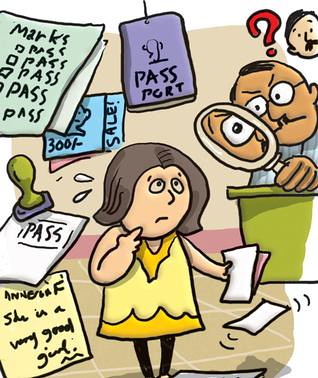Passport verification: The agony refuses to end

If one were to look at complaints of bribe payers on Ipaidabribe.com, many of them relate to bribes paid to police for the verification of passports. This relates to the police verifying the address of the applicants.
Herein lies an interesting tale on how the best intentions of the government can be nullified by one government department.
The process of issuing passports has been digitised to a certain extent with the opening of Passport Seva Kendras in various cities and if one were to visit them on any day, it does not have the 'normal' government office look to it. The reception area is crowded but very functional, and there are actually people to answer your queries and clarify doubts. One is given a unique number as soon as one submits the application and the process of the application to check the credentials takes almost three to four hours based on the rush in the venue.
There are no lazy intervals, and work progresses at a fast pace. ( This is based on an actual visit to a Passport Seva Kendra in Bangalore.)
However, the hitch comes in after this process where the credentials are checked by almost four teams. The final leg of the verification is compulsorily manual, and it is to be done by the police department.
Police verification is the last mile in the issue of a passport and is the most complicated. The problems are there for all to see. It involves an overworked police force forced to do something which they are not keen on and given the scope, it leads to corruption.
There are harrowing tales of how the police refuse to aid the final verification process unless their palms are greased. Most cases, police wait for the applicant to approach them at the police station, and they do not proactively search out for the applicant. When the applicant visits the station, he naturally becomes a target.
There is a certain amount of digitisation of the Passport process before it reaches the police stations, but when it reaches the final leg it worsens. Most police stations do not seem to have an easily searchable record of the applications which have been received by them, and how many of it had been disposed off. If at all they do have such a record, even if it is not digitised and on paper, it is one of their best kept secrets.
So all the grand schemes of the government on automating and digitising passport issue is floundering as the last leg of the process is cumbersome.
Is it realistic to expect short-staffed police stations, to take their eye off serious crime, law and order duties and traffic snarls to concentrate on verifying the addresses of passport applicants? There is something seriously wrong here.
The way out would be for the government to say that if the police does not say a No in maybe 20 days, it should be considered that they have approved the issue of the passport. This would put pressure on the department to look for better ways to spend their time and resources.
There would be a hue and cry, that this would seriously hamper our national security, but one must take a call somewhere. At times, it appears that police are better off doing serious work, rather than the mundane task of checking addresses.
If the police is overburdened, it should authorise other agencies to do the work, and perhaps work on cases referred to them by the other agencies.
There is a serious case for resolving the issue of passport seekers, who feel that they are being harassed for no reason.
K Venkatesh
